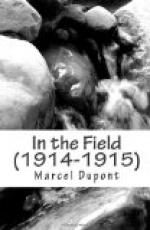Whilst I was busy carrying out the Captain’s orders I had not noticed that the situation had undergone a decided change, and that our chances of being able to complete our task thoroughly had increased considerably. The German guns were no longer aiming at the village. Their fire had become more rapid, and their shrapnel flew hissing over the brigade. We could see them bursting much further off, on the other side of the water, in the direction of the woods crowning the heights whence, in the morning, I had admired the smiling landscape. I inferred then that the advance guard of our corps was debouching. In half an hour it would be there, and the German cavalry, we felt sure, would not hold out much longer.
But our fine infantry had done more than this. They had, no doubt, found good roads, or perhaps the German gunners, hypnotised by the village, had not spied them. For I had now the pleasure of witnessing one of the most exhilarating spectacles I had seen since the opening of the campaign.
From where I stood on the bank I could see the thin line of the bridge above. I did not think that any one would risk crossing it now that it was known to be a mark for the enemy’s fire, but suddenly I saw five men appear and begin to cross it. I could distinguish them perfectly; they were infantry soldiers, an officer and four men. The officer walked first, calmly, with a stick under his right arm, and in his left hand a map which formed a white patch on his blue coat, and behind him the men, in single file, bending slightly under their knapsacks, their caps pushed back and holding their rifles, marched firmly and steadily. They might have been on parade. Their legs could be distinguished for a moment against the blue sky. Their step was so regular that I could not help counting: one, two; one, two, as their feet struck the bridge. But just at the moment when the little group had got half-way across, a hiss, followed by a deafening explosion, made our hearts beat, and we heard the curious noise made by innumerable bullets and pieces of shell striking the water. The Germans had seen our infantry beginning to cross the river, and they were now pouring their fire upon the bridge. I looked again at the men, and saw they were there, all five of them, still marching with the same cool, resolute step: one, two; one, two. Ah! the brave fellows! How I wanted to cheer them, to shout “Bravo!” But they were too far off, and the noise of the fusillade would have prevented them from hearing me.
No sooner had they reached the bank than another little group stepped on to the narrow bridge, and then, after them, another; and each was saluted by one or two shells, with the same heavy rain of bullets falling into the water. But Providence protected our soldiers. The outline of the bridge was very slight, and the gunners of the German cavalry divisions were sorry marksmen. Their projectiles always burst either too far or too near, too high or too low. And as soon as a hundred men had got across, and the first sharpshooters had clambered up the heights that rise sheer from the river and begun to debouch upon the plateau, there was a sudden silence. The enemy’s cavalry had given way, and our corps d’armee was free to pass the Marne by the bridge of Jaulgonne.




